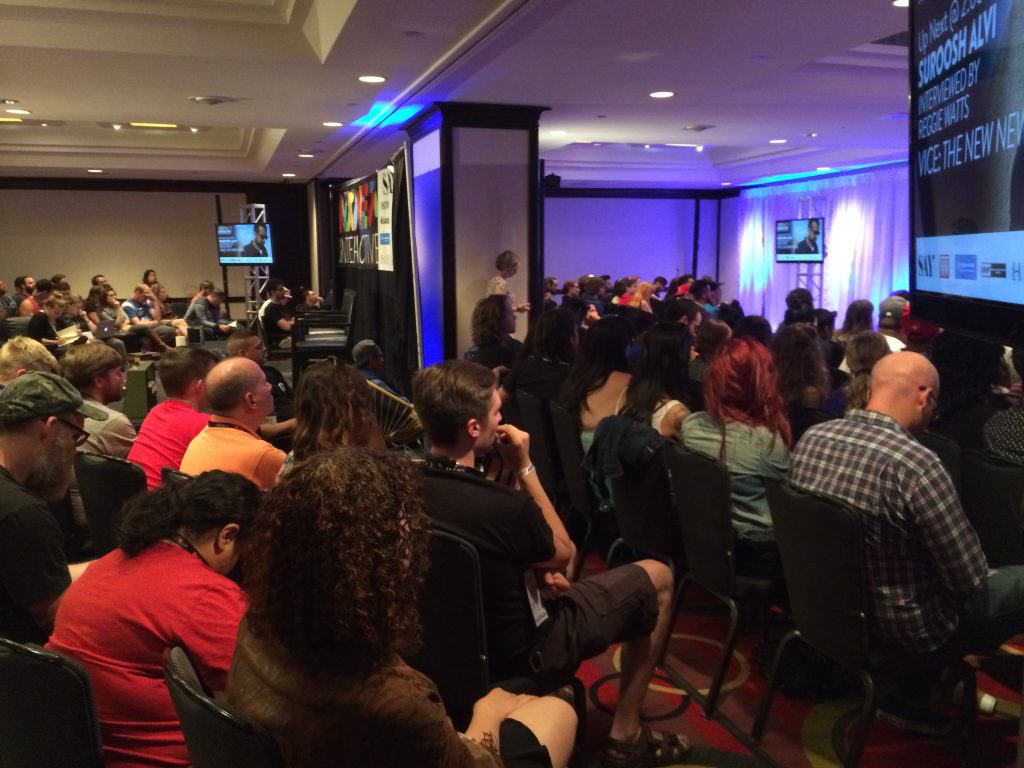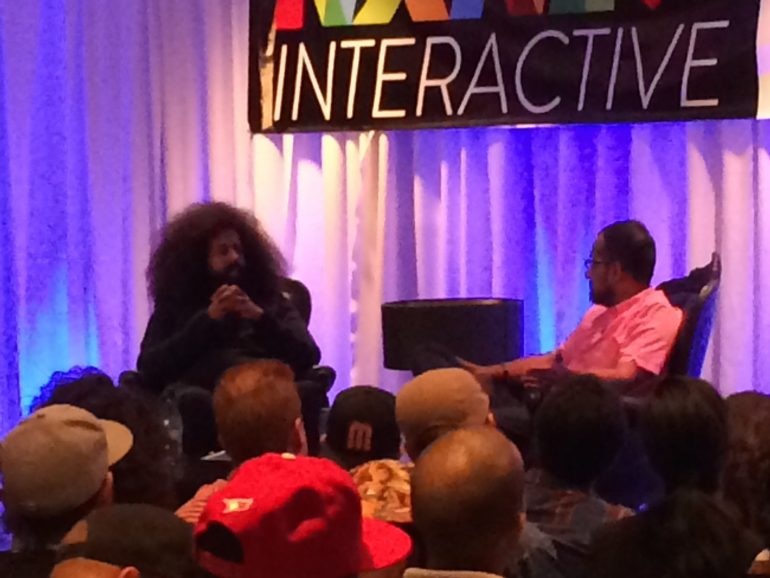On the Friday afternoon of NXNE 2014’s interactive portion, likely the most anticipated speaker told the story of how a niche, punkish startup magazine in Montreal grew to a massively successful multi-platform media company.
Vice founder Suroosh Alvi told the crowd at the Hyatt Regency in downtown Toronto about its humble beginnings. It begins in Montreal, and somewhere along the way involves a visionary investor who gives them a bunch of money and tells them to move to New York.
But after the company had moved to New York City, and during the dotcom bubble burst, the investor pulled out. One morning the founders came to their 27th street office in Manhattan to find it completely empty. They hunted the investor down in Nantucket, the island near Cape Cod. Upon finding him there, the investor glumly offered “the money’s gone…anyone want steaks?”.
Alvi declined, drove back to New York, stole a bunch of mirrors and desks from the 27th street office and relocated to Williamsburg, Brooklyn, two million dollars in debt. Humble beginnings, indeed.
 New York had collapsed, their office had no heat and employees were typing on computers with winter gloves with the finger tips cut off. They persevered through it all, to the company today that’s estimated to rake in $500 million in 2014 and $1 billion in 2016. At last count, it was 150 million people coming to the Vice.com properties, in addition to HBO, on a monthly basis.
New York had collapsed, their office had no heat and employees were typing on computers with winter gloves with the finger tips cut off. They persevered through it all, to the company today that’s estimated to rake in $500 million in 2014 and $1 billion in 2016. At last count, it was 150 million people coming to the Vice.com properties, in addition to HBO, on a monthly basis.
That’s from the startup days of 10,000 copies of their magazine being circulated in Montreal. It has “only taken 20 years,” said Alvi. An IPO is in the cards, as is a potential $2 billion deal with Time Warner for a minority stake.
Alvi said they had to survive at all costs back then, taking a shot at CBC, saying “we’re not a crown corporation, we had to make money”. They started over again “on our ninth life” in Brooklyn, given new life through a new investment, “Vice Records” in 2002. That came mainly through Atlantic records. They sought to “just sign all of our friends’ bands,” and it went spectacularly well. It’s first signee was UK’s The Streets, and the label would go on to sign Bloc Party, The Black Lips, The Stills, Death from Above 1979 and even Snoop Lion. (Although they did pass on Gnarles Barkely, which admittedly Alvi said “wasn’t the smartest decision”).
An expansion from print to music, to Vice Films and VBS.com, to its popular website all followed over the years. They launched international offices in Australia and Japan, and Alvi admitted even then (five to 10 years ago) they were still claiming a “niche audience”.
Nearly every record company wanted a piece of them after the success of acts like Bloc Party, and they had “way too much money,” leading to issues in sustainability and growth. They signed on for another two years with Atlantic, leaving after that to go completely independent. All the issues “and the legal shit” wasn’t very fun though, as Alvi explained, because “were good at signing bands we like and marketing it,” so they signed a new(ish) deal with Warner Brothers.
As a result of Vice’s tasty brand of in-your-face, utterly subjective and completely consumable international news journalism, its had everyone from MTV to CNN asking them how they can get their audiences more engaged. Their first DVD for MTV featured Alvi’s “gun markets in Pakistan” feature, which “in retrospect was a C plus, but went over really well. We had people like CNN.com trying to put that content on their homepage.” CNN told them then that it was the future of news.
It was at that point around 2007 where Vice began producing video on the Internet. They were opportunistic, they were unapologetic and their content went down well with young people.
When HBO signed them, they were able to finally do their video content they way they wanted to (long-form, not short and dumbed down as MTV wanted it), and it seems that all hell broke loose among its popularity along with that singing. They’ve now signed on with HBO for a third and fourth season for the hugely popular television show “Vice”.
As long as they can maintain control of their property, the future stays unchanged said Alvi. Their viewers are smart and “they want to consume news if its given to them in the right way,” despite admitting that VICE is, and has always been, more subjective than other new outlets. “There is substantiation in what we’re saying.”
As for the future, he calls them “platform agnostic” at the moment. But now they’re producing enough content on a global level to push it through all devices and platforms.
It’s a Canadian/American success story and its still growing. To think that after 150 million uniques a one month that a media company is still growing is, well, it’s insane. But its safer to make a bet in a company like Vice than so many other companies around the globe.


